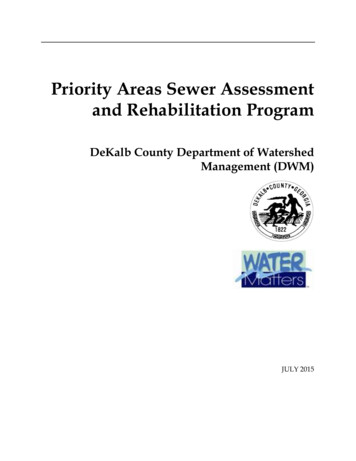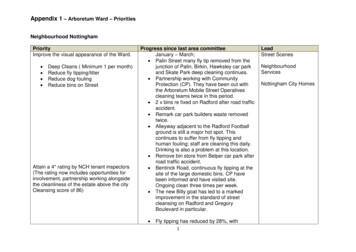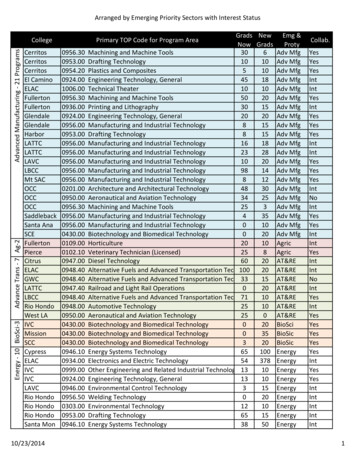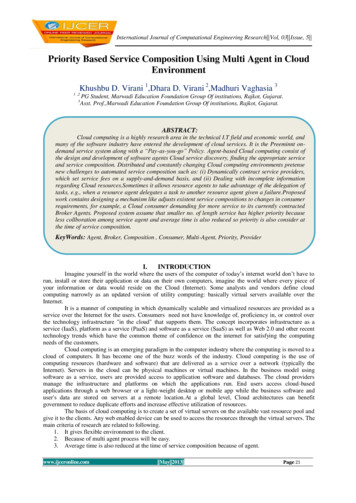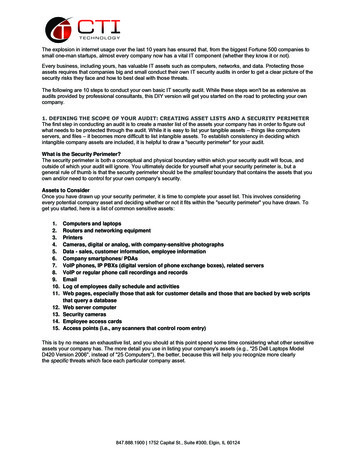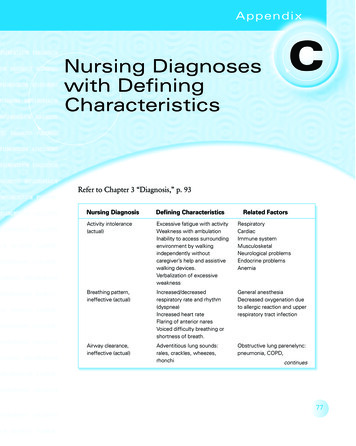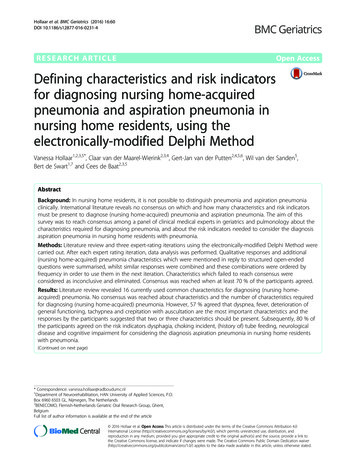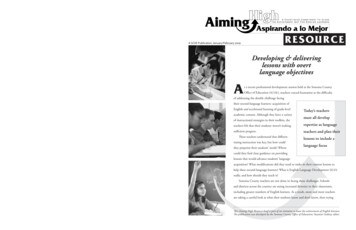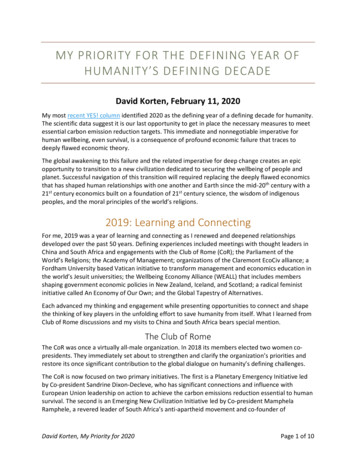
Transcription
MY PRIORITY FOR THE DEFINING YEAR OFHUMANITY’S DEFINING DECADEDavid Korten, February 11, 2020My most recent YES! column identified 2020 as the defining year of a defining decade for humanity.The scientific data suggest it is our last opportunity to get in place the necessary measures to meetessential carbon emission reduction targets. This immediate and nonnegotiable imperative forhuman wellbeing, even survival, is a consequence of profound economic failure that traces todeeply flawed economic theory.The global awakening to this failure and the related imperative for deep change creates an epicopportunity to transition to a new civilization dedicated to securing the wellbeing of people andplanet. Successful navigation of this transition will required replacing the deeply flawed economicsthat has shaped human relationships with one another and Earth since the mid-20th century with a21st century economics built on a foundation of 21st century science, the wisdom of indigenouspeoples, and the moral principles of the world’s religions.2019: Learning and ConnectingFor me, 2019 was a year of learning and connecting as I renewed and deepened relationshipsdeveloped over the past 50 years. Defining experiences included meetings with thought leaders inChina and South Africa and engagements with the Club of Rome (CoR); the Parliament of theWorld’s Religions; the Academy of Management; organizations of the Claremont EcoCiv alliance; aFordham University based Vatican initiative to transform management and economics education inthe world’s Jesuit universities; the Wellbeing Economy Alliance (WEALL) that includes membersshaping government economic policies in New Zealand, Iceland, and Scotland; a radical feministinitiative called An Economy of Our Own; and the Global Tapestry of Alternatives.Each advanced my thinking and engagement while presenting opportunities to connect and shapethe thinking of key players in the unfolding effort to save humanity from itself. What I learned fromClub of Rome discussions and my visits to China and South Africa bears special mention.The Club of RomeThe CoR was once a virtually all-male organization. In 2018 its members elected two women copresidents. They immediately set about to strengthen and clarify the organization’s priorities andrestore its once significant contribution to the global dialogue on humanity’s defining challenges.The CoR is now focused on two primary initiatives. The first is a Planetary Emergency Initiative ledby Co-president Sandrine Dixon-Decleve, who has significant connections and influence withEuropean Union leadership on action to achieve the carbon emissions reduction essential to humansurvival. The second is an Emerging New Civilization Initiative led by Co-president MamphelaRamphele, a revered leader of South Africa’s anti-apartheid movement and co-founder ofDavid Korten, My Priority for 2020Page 1 of 10
Reimagine South Africa. This initiative seeks a future that brings humans into co-productive balancewith the regenerative systems of a living Earth while securing material sufficiency and creativeopportunity for all.Both initiatives build on longtime CoR commitments. The success of each ultimately depends on thesuccess of the other. Yet treating them as initially separate is a breakthrough strategic movebecause they involve quite different short-term priorities that can be properly addressed only bygiving each the distinctive attention it requires. The Club of Rome 2019 meeting in Cape Townprovided opportunity for extended exchanges with both Sandrine and Mamphela that deepenedmy appreciation for the logic of the separation.Rapidly unfolding environmental and social collapse provides a dramatic demonstration of theexistential failure of existing economic institutions and theory. Yet decisive climate action cannotwait for the new economics or the for the systemic transformation of culture, institutions,technology, infrastructure that a civilizational transformation will require.The Intergovernmental Panel on Climate Change has warned that to keep the global temperatureincrease below the target of 2.7 degrees Fahrenheit, we must reduce carbon emissions by 45percent by 2030 and 100 percent by 2050. Decisive action must begin immediately using existingpolicy tools implemented through existing institutions. The Planetary Emergency Initiative focuseson that task.The longer term need for civilizational transformation will require far deeper, more complex, andless understood system changes and ways of thinking, including a new economics. Though stillembryonic, serious discussion of what the deeper transformation will require is now underway.That a great many people are joining in gives me hope for the human future.ChinaFor several years, I’ve been inspired by China’s visionary commitment to an ecological civilizationnow enshrined in both its national and Communist Party constitutions. My recent visit to China wasdeeply sobering, however, as it raised troubling questions about the seriousness of thatcommitment.The visit began with a private lunch with Minister Pan Yue, who holds the rank of Full Minister inChina’s Communist Party, in his official dining room in the Central Academy of Socialism in Beijing.He is widely considered to be China’s leading environmental advocate and a primary architect ofChina’s commitment to an Ecological Civilization.I knew from my web research that Minister Pan once held a position in China’s Ministry of theEnvironment from which he shaped China’s environmental policy in ways that challenged powerfuleconomic interests. In response to political pressure the Communist Party raised his rank andassigned him to a new post that stripped him of authority over environmental policy.None of this was mentioned over our lunch. Rather we shared thoughts on the great challengesfacing humanity, the importance of the human transition to an Ecological Civilization, and the needto describe more clearly what that transition will require. I found Minister Pan’s intelligence anddedication to be as extraordinary as his generous and elegant hospitality.David Korten, My Priority for 2020Page 2 of 10
The primary invitation that took me to China was to give a plenary presentation at an internationalconference in Wulong, a natural wonder site and major Chinese tourist destination. I focused mypresentation on the reasons why GDP growth inevitably drives devastating inequality andenvironmental destruction—thus creating an irreconcilable conflict with the priorities of anEcological Civilization. My intention was to celebrate, affirm, and serve the transition to anEcological Civilization that I understood to be China’s defining policy commitment.I began to suspect I might be over-estimating that commitment when I realized that otherconference speakers and discussants—especially those of Chinese nationality—rarely if everuttered the words Ecological Civilization. It seemed that most all embraced economic growth as adefining priority supported by what many referred to as “The Two Mountains Theory.” I initially hadno idea what the two mountains referred to, but the references implied that China seeks to climbboth simultaneously.As eventually explained to me, the Two Mountains theory comes from the words of China’sPresident Xi Jinping. The first mountain is economic growth. The second mountain is care for theenvironment. They together define China’s economic priorities—two mountains to be climbedsimultaneously. At least that is how I interpreted what I heard and how most Chinese with whom Idiscussed the theory seemed to understand it. I had intended to affirm what I had understood to beofficial policy. Perhaps I had instead unintentionally directly challenged it. Not a wise thing to do inChina.Yet my presentation was received with an enthusiasm far beyond my expectation and there was nomention of any conflict with official policy. I was given VIP treatment throughout my visit and givena high rank in the individually assigned conference seating. I concluded that as a foreigner perhaps Iwas able to say what many of those present believe—but dare not say.I now understand that the Two Mountains Theory originates from President Xi’s repeatedreferences to lucid waters and lush mountains as assets more valuable than gold and silver. Hecommonly follows with the observation that a healthy environment is a valuable economic asset—asource of silver and gold.A superficial interpretation reduces the Two Mountain Theory to the equivalent of what neoliberaleconomists call “sustainable development”—a term they use to assure the public that, with somemodest environmental protection, there are no natural limits to growing GDP.In studying more carefully the English translations of President’s Xi’s references to the importanceof a healthy natural environment, it seems his intention is to communicate a far deeper meaning.Rather than suggesting that China or the world climb two mountains simultaneously, he is sayingthat care for Earth will lead to the real wealth of good health and natural beauty we truly seek.If this is a correct interpretation, President Xi is not calling the Chinese people to climb twomountains simultaneously. He is calling on them to make a clear and conscious choice for the truewealth of healthy rivers and beautiful mountains lush with life on which human wellbeing depends.Yet, as do most nations, China assesses its economic performance by the rate of growth of its GDP.This creates an irreconcilable conflict. A growing GDP may create new jobs and put an upwardpressure on wages. Its primary and most certain consequence, however, is to grow inequality andthe fortunes of billionaires through the exploitation of people and nature.David Korten, My Priority for 2020Page 3 of 10
These are consequences wholly counter to the professed commitments of President Xi and theChinese Communist Party. The result is an understandable confusion on the part of thoseresponsible for implementing national priorities created by China’s continuing obsession with GDPas its defining measure of economic performance. If the wellbeing of people and Earth is indeedChina’s official priority, then it best eliminate the ambiguity by joining New Zealand, Iceland, andScotland in replacing GDP with indicators of the wellbeing of people and planet as the basis forevaluating economic performance.South AfricaIt is Mamphela Ramphele’s dream that Mother Africa might build on its legacy as the birthplace ofhumanity to also become the birthplace of a new civilization. With this dream in mind, she invitedthe Club of Rome to hold its 2019 annual global gathering in Cape Town in the hope that thediscussions might help inspire her African colleagues to rise to the challenge.Her knowledge of my work led her to recruit me to deliver the meeting’s plenary address framing anew economics for a new civilization. She also arranged for me to stay on for further presentationsand discussions with her South African colleagues in Cape Town and Johannesburg. Discussions of acivilizational transition have yet to gain traction in South Africa, but the individuals and groups Iencountered were ready and eager to explore the possibility. The experience awakened me to whatAfrica’s distinctive contribution might be.Meeting human needs in a balanced relationship with a finite living Earth will require strong localself-organization within self-reliant living communities. Modern societies have largely forgottenhow to structure and manage such relationships. The West’s colonization of Africa and itssubsequent promotion of economic development defined by the flawed theories of neoliberaleconomics wrought enormous damage to the African people by separating them from one anotherand the land. It was a pattern repeated throughout much of the world.Compared to most of the world’s people, however, indigenous Africans remain relatively close to apast in which they lived for thousands of years in tribal communities in co-productive partnershipwith one another and Earth. Though these communities might sometimes war with one another,for millennia most maintained ways of working together with one another and nature within theirown communities that were far more cooperative, peaceful, and egalitarian than the typicalmodern experience. It may not be too late for Africans to reclaim and apply valuable lessons of thisearlier experience while adding beneficial contemporary science and technology to put themselvesat the forefront of humanity’s civilizational transition.South Africa, with its strong connection to Africa’s traditional roots, its relative political freedom, itsdesire to bridge its social divisions, and its mastery of modern communications technologies, maybe in a strong position to engage this process of reclaiming and applying this ancient wisdom. SouthAfrica’s truly multi-racial/multi-cultural population and evident freedom of speech can be valuableassets for the creative processes that the transition to a new civilization will require. Leading thattransition could be an opportunity for black Africans to renew their pride in their ancestry whilesimultaneously providing an essential service to a world placed in dire peril by the recklessseparation of people from one another and nature.A related lesson from South Africa came from the visits Fran, my life partner and wife, and I madeto two extraordinary museums: The Cradle of Humankind Museum outside of Johannesburg andDavid Korten, My Priority for 2020Page 4 of 10
the Apartheid Museum in Johannesburg. The Cradle of Humankind Museum curates the geologicalrecord of pre-human and human species spanning some 6 million years. The Apartheid Museumcurates pre-colonial and colonial precursors of South Africa’s apartheid experience and places itwithin a larger frame of global violence and oppression. These museums documented an aspect ofthe human experience I had not previously seen so clearly.Humans ultimately depend on Earth’s finite supply of productive lands for our food and water, toprocess our wastes and to provide space and materials for our shelter. Since the earliest emergenceof homo sapiens, people worked out who had rights to make what use of occupied lands. Much ofthe modern legal system deals specifically with allocating and litigating such rights.Human history records a constant and growing competition between individuals, families, tribes,city states, and ultimately nation states and corporations for control of Earth’s finite supply ofproductive land. This competition is memorialized by the biblical story in Genesis of the competitionfor land between two sons of Adam that led Cain, the farmer, to kill his brother Abel, the shepherd.Since that biblical time, our numbers have increased many times, creating an ever more intensecompetition for land among humans and between humans and other species.Throughout history, this competition drove human migration in search of new lands suitable forhuman habitation. The competition was constant, often violent, and led in recent years to greatwars of conquest and occupation between heavily militarized nation states.The museum exhibits were filled with stories of this competition. The resulting dynamics of violenceand conquest often led those with power to force those who lacked power off the lands from whichthey once derived their living and into positions of servitude to those who displaced them. Theresulting threat of invasion and death or servitude created a demand within individual groups tobirth ever more warriors. This in turn increased the intensity and violence of the competition.Related issues arise from the competition for living space between humans and other species. Weare so used to competition for land that we easily overlook the possibilities for turning fromcompetition to cooperation to create the conditions on which the wellbeing of people and naturedepends.We are learning that the species that survive and thrive in perpetuity ultimately bring their numbersinto balance with their local environment while taking only what they need and finding their placeof service in balanced relationship to the whole. Our human future depends on learning how we, asa now global species, can do the same.I am not aware of any society that has come up with a peaceful, just and equitable way of balancingthese needs and interests. The museums provided no exhibits suggesting the existence of such asociety and I don’t recall ever hearing mention of one. The spreading failure of Earth’s regenerativesystems is displacing millions, potentially billions, of people from places where they and theirancestors lived for thousands of years. We now face ever greater urgency to learn to deal with thischallenge peacefully and equitably. This presents one of the many challenges a 21st centuryeconomics for a 21st century civilization must address.David Korten, My Priority for 2020Page 5 of 10
2020: A 21st Century Economicsfor a 21st Century CivilizationThe most significant barriers to a civilizational transformation reside in the human mind. Theseinclude the mechanistic paradigm of Western science, the individualism of Western culture, and theintellectual and moral corruption of neoliberal economics. The fact that the major barriers have noexistence outside the human mind doesn’t mean the transformation will be easy, but mentalframes can change quickly, and that transformation is underway.The defining frame of contemporary science is in transition from a cosmology of mechanism to acosmology of organism. The dominant Western values frame is shifting from an exclusive concernfor individual rights to a deepening recognition that the interdependence of life means we bear acollective responsibility for the well-being of one another, including all the many members ofEarth’s community of life.The neoliberal economics that maintains a hegemonic dominance in education, media, andeconomic policy, however, remains resolutely stuck in its mechanistic worldview, its denial ofcommunity, its refusal to consider the relevance of other disciplines, and its claim that because itreduces all values to money it is an objective values-free science. It assumes that money is theultimate measure of wealth, growing GDP is the ultimate measure of economic performance, andwe each best serve society by competing to maximize our personal income and consumption.Every one of these assumptions is false, yet we educate our young to live by them and reinforcethem constantly through public media. We find ourselves playing out a bold global experiment todiscover the consequences of their application and now have a definitive result. The resultingsystem makes a few people very rich while denying our humanity, reducing most people to lives ofservitude, destroying the regenerative systems of a living Earth on which all life depends, anddriving humans to potential self-extinction.As these results become increasingly evident, neoliberal economics is fast losing credibility withintellectuals of critical mind. Yet it holds sway in the public mind for lack of a credible alternative.My priority for 2020 is to work with global partners on the development and implementation of a21st century economics for a 21st century civilization. The following are some of the defining issues Ibelieve a 21st century economics must address if we are to have a viable human future.Prioritize WellbeingChina is not alone in its need to choose which of two mountains it seeks to climb: the growing GDPmountain or the well-being mountain. Every country faces a similar choice.The growing GDP mountain has a well-worn path extensively marked and mapped by neoliberaleconomics. The well-being mountain has faintly visible paths once traversed by indigenous peoplewith small populations and modest needs that lacked the massive destructive powers of the globalcorporation and modern carbon energy technology. To climb the well-being mountain will requirefinding and marking new paths with the help of a new economics as we put into place the culture,institutions, technology, and infrastructure of a civilization supportive of the wellbeing of peopleand planet.David Korten, My Priority for 2020Page 6 of 10
This new economics must recognize that life is inseparable from community and the processes bywhich living communities self-organize to create and maintain the conditions essential to thewellbeing of their members. The policies of 20th century economics disrupted community to growthe power of money and those who control it. The policies of 21st century economics will rebuildand empower living community to secure the well-being of all.Beyond meeting basic material needs for food, water, and shelter, most people find that furthercontributions to their sense of wellbeing and happiness come more from their relationships withother people and nature than from increasing material consumption. At their best, theserelationships build a sense of belonging and mutual caring. They also offer opportunities for serviceessential to our need for a sense of self-worth. Because of this need, having meaningful work holdsan importance far beyond a paycheck. Think of the many hours many of us devote to volunteerwork. Our paid work can and should be as meaningful as our volunteer work.Focused on growing GDP as the economy’s defining purpose, neoliberal economics fails even toacknowledge these essential elements of wellbeing, let along value them. It assigns value only topaid labor and only at the market wage. Family and community relationships and service count fornothing. The resulting policies of neoliberal economics leave too many of us living alone andworking alone, deprived of self-worth and an adequate means of livelihood.Actively denying community, it is no surprise that neoliberal economics ignores the mutual benefitsof sharing goods and power that healthy indigenous communities have long recognized as essentialto their collective wellbeing. Those communities educated their children in ways of cooperation andsharing developed over countless generations to secure the wellbeing of all. Commonly theseincluded mutually understood rules for the sharing of one’s labor and the gifting of one’s surplus.They also had methods for collectively disciplining those who failed to honor the rules, includingcollective shaming and even banishment, which could be the equivalent of a death sentence.It is instructive that humanity is in deep trouble specifically because of our common embrace of aneconomic ideology that celebrates individual greed in disregard of the consequence for others. Solong as societies embrace GDP growth as their defining economic priority, growth will be theexplicit goal and the flawed assumptions of 20th century economics will hold sway. Society will valuemoney over life; empower corporations over communities; and reward the psychopath over thecaretaker.We are now awakening to the reality that by abandoning the living community on which ourwellbeing depends, we have reduced ourselves to a lonely daily struggle for survival in servitude toan economy devoted to growing the power and financial statements of the world’s already richestpeople. To escape from our self-entrapment, we must rebuild community and repurpose money.Repurpose MoneyFor thousands of years humans shared power as self-reliant, self-organizing communities united bymutual dependence and caring with no need for money. The further separated they became fromthe lands from which they together had for countless generations met their mutual needs for food,water, energy, and shelter, the more they turned to money as a substitute for the mutualobligations that previously united them.David Korten, My Priority for 2020Page 7 of 10
For a time, it felt like freedom from the mutual obligations that come with community life. But italso meant abandoning the caring relationships on which the wellbeing of life depends. Focused onmoney we became captive to the illusion that value resides in money. We forgot that money’s valueresides in the products of life’s labor that we agree to exchange for money. So long as we remaincaptive to the illusion, we fail to notice that as we destroy life to make money, we are growingcollectively poorer on a path to ultimate self-extinction.As relationships of mutual caring and cooperation were monetized, power that once was sharedamong those dedicated to the common good, became ever more concentrated and centralized inthe hands of those who seek personal gain at community expense. First come the bankers whocreate money by loaning it into existence in return for a promise to repay with interest money thebanker created from nothing. Next come the speculators who borrow from the bankers to gamefinancial markets to profit from financial bubbles. The bankers and speculators both reap profitsthat give them ever greater control of the declining pool of real wealth while producing nothing ofactual value in return.The loans can be repaid with interest only if GDP and the financial bubbles continue growing togenerate demand for enough new loans to pay the principle and interest due on loans outstanding.Lacking that growth, borrowers are forced into default, banks close, money disappears, theeconomy collapses, government is forced to bail out the bankers, and the cycle repeats. It is asystem designed to benefit private bankers and speculators in total disregard of the wellbeing ofpeople and planet.The ability to create new money is the ability to create unearned buying power. Money is a purelyhuman creation with no existence outside the human mind. We have no reason to create it exceptto serve the common good. Hence its creation should always be a transparent public functionaccountable to the community it is intended to serve.It defies reason to assume that society benefits from giving this power to privately owned, for-profitbanks dedicated to maximizing their own profits in disregard of community consequences. It makeseven less sense to give this power to transnational banks with no loyalty or accountability to anycountry or community.The more unequal the society and the more relationships are monetized, the more serious thefinancial dysfunction becomes. Under conditions of significant inequality, the poor are forced intoever deeper debt to obtain the basics of living. What money they have thus flows to the rich whoare eager to earn interest on money for which they have no personal need.An economics for the 21st century will teach that money is a number that has value only because weaccept it in exchange for the things of real value—mostly things that living beings have createdthrough their labor. It will teach that:1. Caring relationships are more valuable than relationships based on financial exchange.2. Money should be created by government and spent into circulation to fund public servicesand infrastructure.3. A lack of money should never be a society’s defining constraint because nationalgovernments can create it with a computer key stroke.4. Financial speculation serves no beneficial purpose and should be prohibited.David Korten, My Priority for 2020Page 8 of 10
With these lessons in mind, we will reduce our dependence of money as we rebuild the caringrelationships of community essential to the wellbeing of people and planet.Redefine GenderRebuilding the caring relationships of community life will require taking the issue of gender equalityfar beyond a demand for equal pay for equal work. The long-term well-being of people and naturerequires reversing the process of monetizing relationships. To achieve that with the gender equitythat current times and justice demand, gender roles will need to be redefined.In traditional societies males and females had distinctive community roles shaped by theirdistinctive biological functions. Because women birthed and breastfed the children, they naturallyassumed roles as the primary caretakers of the family and managers of the household. Menassumed roles as defenders and hunters that might require journeys far from home.Men bonded the other men on whom their success in battle or on the hunt depended. Womenbonded with the other women in the place-based communities in which they shared the duties ofchildcare, gathering food from nature’s gardens, and preparing meals. Dependence on an individualpartner of the opposite gender was more limited than in more recent times.Colonization and economic development disrupted the direct relationships members of traditionalcommunities previously had with one another and the land. As we separated from the land,households and communities became less self-reliant. As money intermediated ever more of ourrelationships, we yielded ever more power to those to whom we sold our labor in return for themoney they in turn demanded in return for food and other essentials of living.For a time, women continued in their roles as caretakers of the household while men ventured outto obtain the money required to fund a household budget adequate to the family’s needs. Womenbecame dependent on a male partner for that income—usually obtainable from a single job.Dependence on the relationships of a caring community declined for both men and women.Most individual jobs now pay too little to maintain a household. As the economic system forcesboth men and women to devote ever more of their waking hours to paid employment to maintaintheir household, gender roles blur in historically unprecedented ways. Many of the family andcommunity relationships essential to our wellbeing and to the emotional health and developmentof our children have disintegrated. Home care—including childcare—is either neglected orpurchased in the market.Calls for equal pay for women and men and for a government guaranteed basic income and/orgovernment funded child and elder care may have their place. But they do not address our essentialneeds for deep
MY PRIORITY FOR THE DEFINING YEAR OF HUMANITY’S DEFINING DECADE David Korten, February 11, 2020 My most recent YES! column identified 2020 as the defining year of a defining decade for humanity. The scientific data suggest it is our last opportunity to get in place the necessary meas

